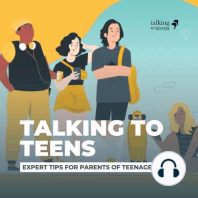22 min listen

Ep 233: The Opioid Crisis: What Parents Need to Know
Ep 233: The Opioid Crisis: What Parents Need to Know
ratings:
Length:
25 minutes
Released:
Mar 19, 2023
Format:
Podcast episode
Description
Please give Talking to Teens 5 stars on Apple Podcasts and Spotify. Reviews help other parents find us and helps us keep the lights on! Thanks for listening!Many of us picture drug addiction as a vague threat, something that might be a possibility for an unhoused person or party animal but never for our own kids. When we hear concerns about the opioid crisis, we might wave it off as a problem that most likely could never affect us. We typically think that even if kids party a little,–say, experiment with marijuana or alcohol-that they’ll probably come out on the other end just fine.But what we don’t realize is just how susceptible our kids are to opioid use. Nowadays, traces of opioids are found in marijuana, cocaine, or even candy. They’re in millions of medicine cabinets, available on the streets in alarming quantities, and have been prescribed to nearly a third of adults in the United States. If we want our kids to stay safe from the opioid crisis, it’s time to educate ourselves–and our kids.To help us wrap our heads around the severity of this crisis, we’re talking to Holly Geyer, author of Ending the Crisis: Mayo Clinic’s Guide to Opioid Addiction and Safe Opioid Use. Holly is an addiction medicine specialist at the Mayo Clinic in Phoenix, Arizona, where she leads the Arizona Opioid Stewardship Program. She’s served on several Arizona department of health subcommittees, works with a number of organizations to raise opioid awareness, and lectures nationally on opioid addiction and safe opioid prescribing.In our interview, we’re explaining what opioids are and how they affect the human body. We also discuss how we can look for signs of opioid abuse in our kids, and what we can say to kids who might be at risk of an opioid addiction.What Parents Need to Know About OpioidsAs an opioid expert, Holly is often asked: what’s the difference between opioids and opiates? In the episode, she explains that opiates are derived from the poppy plant, while opioids are synthetically created to mimic the effects of opiates. To the average person, the terminologies are basically interchangeable, she explains. It is important to remember, however, that opioids are often created in illicit environments, meaning that they’re usually not regulated and could be a lot more dangerous than opiates, Holly says.These “painkillers” cause a sense of euphoria and often make us feel as though our troubles are slipping away–until they stop working and our body begins to crave more and more. As our usage grows, so does our tolerance, explains Holly. If taken exactly as prescribed, we might be relatively safe from the serious threat of addiction, but if we crush and snort it, inject it or take more than we’re supposed to, the results can be deadly. In fact, opioids are now the leading cause of death for people under 45.How can taking opiods be fatal? Overdose, explains Holly. Overdose occurs when an individual consumes so much of an opioid that they become overly sedated, to the point where they forget to breathe, she says. If you suspect someone is taking opiods and they seem sleepy, cold or unintelligible in their speech, they might be overdosing. In the episode, Holly and I lay out a number of actions we can take if we’re presented with an overdosing individual–including an immediate dial of 911 and a dose of naloxone.It’s pretty clear that opioid addiction is not something we’d want to encounter, especially in our own families. But how can we actively work towards preventing these tragic outcomes? Holly explains in the episode.How To Tell If Your Teen is At RiskTeen opioid addiction is no joke. Rates of teen opioid use are skyrocketing, Holly explains. If your teen starts using young, has a history of meddling with other substances, deals with mental health issues or experiences chronic pain, the risk is even higher. Even if you’ve never brought prescription opioids into the house, kids are often exposed when trying a different drug that happens to be l
Released:
Mar 19, 2023
Format:
Podcast episode
Titles in the series (100)
Ep 21: Teaching Your Teen to Be Happy: Tim Bono, author of When Likes Aren't Enough, reveals some strategies parents can use to help teens cope with setbacks and maintain a positive outlook in the face of obstacles and failure. Ultimately, the tools discussed in this interview are things that by Talking To Teens: Expert Tips for Parenting Teenagers